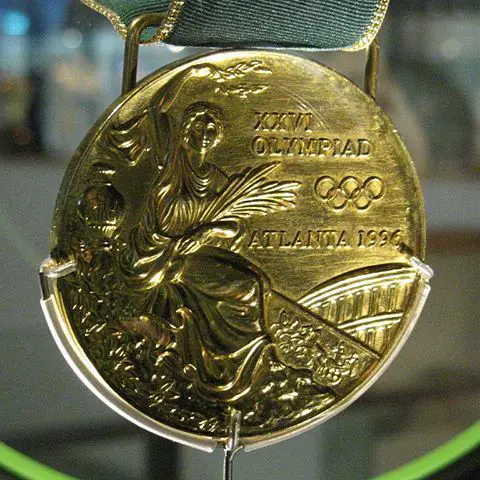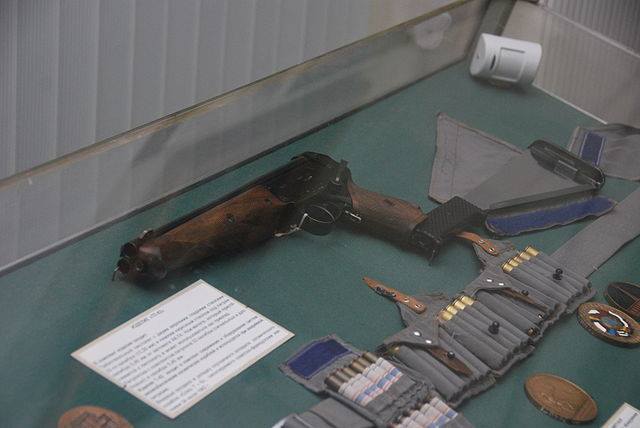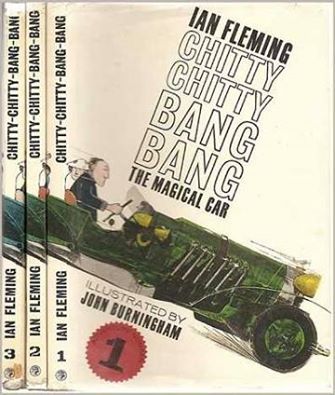 The weekly collection of random and fun facts. In this week’s edition: A Solid Gold Medal, Russian Machetes in Space, Chitty Chitty Bang Bang, A Day and Year on Venus, and the Origin of Alma Mater.
The weekly collection of random and fun facts. In this week’s edition: A Solid Gold Medal, Russian Machetes in Space, Chitty Chitty Bang Bang, A Day and Year on Venus, and the Origin of Alma Mater.

First place in an Olympic event will get you a gold medal, but there hasn’t been a medal made purely from gold in quite some time. The last 100% solid gold Olympic medal was awarded at the 1912 Stockholm Games in Sweden. Why the change? Well, it all comes down to cost.
During the 2012 Summer Olympic Games in London, 302 medals were given away to first-place finishers. The value of the physical gold on those medals was around $708 at the time. The gold medals, as stipulated by the International Olympic Committee, had to have six grams of gold. In addition, the medals had to have 92.5% silver while the rest of the medal was made of copper. While the cost of those medals equaled out to $213,816, it would have cost around $6 million if they had been made of solid gold. The gold medal in the London Olympics was already the priciest in modern history due to the current gold prices even without being entirely made of gold.
The solid gold medal awarded at the Stockholm Olympics didn’t come close to the price of the current medals. The gold price in 1912 averaged around $18.93 per ounce of gold. The weight of the medals at the 1912 games was about 24 grams, or 0.77 ounces, and much smaller than the weight of 400 grams of a London gold medal. Each gold at the Stockholm Olympics cost only $14.58. In today’s dollars they would have cost just over $300. The price of the gold in those medals today (at current gold prices) would be about $995. Source, Source, Source
 Russian cosmonauts carried a machete and a shotgun in their re-entry pods until 2007 to protect themselves from bears and other animals when they landed back on Earth. Strange but true. Because of the chance that the cosmonauts landed in a remote spot around the Taiga region in Russia, a shotgun, which had been modified with three barrels and a blade, was taken along just in case they ran into trouble, mainly from wild animals. But the machete-like blade could also be used as an axe in case the cosmonauts needed to cut down some trees.
Russian cosmonauts carried a machete and a shotgun in their re-entry pods until 2007 to protect themselves from bears and other animals when they landed back on Earth. Strange but true. Because of the chance that the cosmonauts landed in a remote spot around the Taiga region in Russia, a shotgun, which had been modified with three barrels and a blade, was taken along just in case they ran into trouble, mainly from wild animals. But the machete-like blade could also be used as an axe in case the cosmonauts needed to cut down some trees.
There was an incident in 1965 when cosmonauts Alexei Leonov and Pavel Belyaev had touched down in Taiga in their lander, the Voskhod-2, that may have contributed to the reason the Russians decided to carry the objects with them. The men had to spend a few days isolated in the forest as they waited for rescuers, and bears were seen from rescue helicopters moving toward the area where the two cosmonauts were camping .
Usually a space capsule isn’t the best place for a gun or sharp objects, but it seems the Russians had a good reason to do so after spending the time getting their cosmonauts safely back to Earth. Source
 The children’s novel, Chitty Chitty Bang Bang: The Magical Car, was written by Ian Fleming who was also the creator of the James Bond novels. Fleming wrote the children’s book as a bedtime story for his own son, Casper, and it was published in 1964.
The children’s novel, Chitty Chitty Bang Bang: The Magical Car, was written by Ian Fleming who was also the creator of the James Bond novels. Fleming wrote the children’s book as a bedtime story for his own son, Casper, and it was published in 1964.
Chitty Chitty Bang Bang was the story of a flying car that takes the Pott family on an adventure. It was made into a film in 1968 starring Dick Van Dyke, and this helped to make the story into a classic for children as well as adults. A stage show was also made about the story in 2002 that opened in London. Frank Cottrell Boyce wrote three additional stories to continue Fleming’s Chitty Chitty Bang Bang story; Chitty Chitty Bang Bang Flies Again, Chitty Chitty Bang Bang and the Race Against Time, and Chitty Chitty Bang Bang Over the Moon. Source
 Venus is a strange place. It has a thick atmosphere of carbon dioxide, and it’s filled with sulfuric acid clouds. This keeps the planet very hot. It’s similar in size to Earth, but just a bit smaller, and is geologically active. One of the strangest things about Venus, however, is how it rotates. It spins in the opposite direction as Earth, and it spins extremely slow. So slow, in fact, that to make one full rotation on Venus takes about 243 days on Earth. The sun only rises two times during each Venusian year, once about ever 177 Earth days, and it rises in the west and sets in the east because of its opposite rotation. Since Venus is closer to the sun than Earth, it takes the planet about 225 Earth days to make one full rotation around the sun to make one Venusian year. What this means is that a day on Venus lasts longer than a year on Venus. Source, Source
Venus is a strange place. It has a thick atmosphere of carbon dioxide, and it’s filled with sulfuric acid clouds. This keeps the planet very hot. It’s similar in size to Earth, but just a bit smaller, and is geologically active. One of the strangest things about Venus, however, is how it rotates. It spins in the opposite direction as Earth, and it spins extremely slow. So slow, in fact, that to make one full rotation on Venus takes about 243 days on Earth. The sun only rises two times during each Venusian year, once about ever 177 Earth days, and it rises in the west and sets in the east because of its opposite rotation. Since Venus is closer to the sun than Earth, it takes the planet about 225 Earth days to make one full rotation around the sun to make one Venusian year. What this means is that a day on Venus lasts longer than a year on Venus. Source, Source
 When you graduate from college, the place where you attended school becomes your “alma mater”. You can now tell everyone your alma mater and affix a decal to your car. But where did this come from? It was first used in 1710 in reference to British universities one had attended, and it came from what most of us probably had trouble with in school if we had been exposed to it–Latin. Alma mater literally means “bountiful mother” in Latin. The Romans gave this title to the goddesses Ceres and Cybele, and alma meant “nourishing”, and mater meant “mother”. Did your college or university feel like a “nourishing or bountiful mother”? Source
When you graduate from college, the place where you attended school becomes your “alma mater”. You can now tell everyone your alma mater and affix a decal to your car. But where did this come from? It was first used in 1710 in reference to British universities one had attended, and it came from what most of us probably had trouble with in school if we had been exposed to it–Latin. Alma mater literally means “bountiful mother” in Latin. The Romans gave this title to the goddesses Ceres and Cybele, and alma meant “nourishing”, and mater meant “mother”. Did your college or university feel like a “nourishing or bountiful mother”? Source
That’s it for another fact filled edition for this week. Feel free to browse the other Random Facts.

